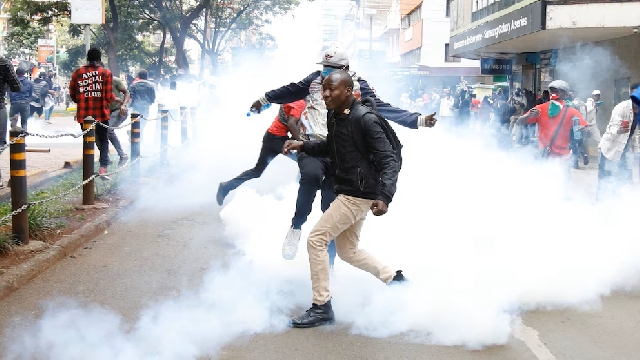Using courts to stifle Demo Hub protestors' rights risks sparking citizens’ uprising – LINSOD warns ‘despotic’ Akufo-Addo gov’t
 A scene from Kenya's recent youth-led uprising
A scene from Kenya's recent youth-led uprising
The government is behind the circuit court’s refusal to grant bail to some Democracy Hub leaders and their fellow protestors who have been arrested by the police and detained for various charges including conspiracy to commit a crime, to wit, unlawful assembly and causing unlawful damage, among others, Lawyers In Search of Democracy (LINSOD) has alleged.
The group’s leader, Oliver Barker-Vormawor, who is among the more than 30 others arrested, arraigned and denied bail, was captured in a viral video turning off the ignition of a police vehicle and bolting with the car key.
In a statement, LINSOD said in its objective view, “the refusal of bail to the demonstrators, who, whether or not have caused some minor destruction to public property, on one hand, and remanding them to re-appear in court after two weeks, on the other hand, is unusual, and obviously not normal.”
“It is reminiscent of regimes of brutal dictatorships and authoritarian rule, which we thought we had moved away from since 1992 when the Fourth Republic was ushered in,” the statement co-signed by Eric Delanyo Alifo (President) and Theophilus Dzimega Jr (Secretary) said.
“It is because courts of justice in democracies, and in normal times, do not, and must never, subject mere demonstrators to the kind of ruling made by the circuit courts in Accra yesterday that we have come to the conclusion that the hands of the government are hugely behind this ill-treatment of the demonstrators,” the group explained.
The group noted that circuit courts’ “rather shocking and regrettable” decision to remand the suspects en bloc in police and prison custody for two weeks without giving them access to their family and lawyers, was most unexpected since the courts are where the rule of law should prevail.
“Again, the very fact that the Office of the Attorney General had run to the circuit courts-where the practice is normally for the police to represent the Republic-and took over the prosecution, and prayed that the demonstrators be remanded instead of admitting them to bail as would reasonably be expected in a proper democracy where the rule of law works, reveals amply that the ruling NPP government is behind the brutality of the demonstrators,” LINSOD argued.
“What shocks our minds is that the courts in this case sided with the government to subject the demonstrators to inhumane treatment, and abuse of their rights without even considering the cause the demonstrators were fighting for, which is the ‘galamsey’ menace,” LINSOD noted.
The group said, as a body of lawyers, it knows that by law, “the continuous detention of suspects before their trial, is tantamount to punishing them for the alleged crime of which they are charged, and before they are even convicted of same.”
“Accordingly, bail must not be denied to suspects unless it is reasonably believed that they shall not reappear in court when they are on bail; or they shall interfere with the further investigation of the charges against them, among others,” LINSOD put forth, adding: “In this particular instance, some of the demonstrators who are held remanded into custody are pregnant women, children; asthmatic and diabetic patients, who are no flight risk at all. Many of them are ordinary law-abiding Ghanaian citizens from responsible families.”
LINSOD also said as lawyers pushing for adherence to proper democratic tenets in Ghana, “We know that nowhere in proper democracies, all over the world, will demonstrators who have not murdered or assaulted anyone, and have not attacked law enforcement personnel, or cause and considerable and extensive damage to important public property are held in custody for more than 48 hours.”
The opposite, the group mentioned, “Can happen only in despotic regimes, which we thought we had moved away from in Ghana since over three (3) decades ago. Demonstrations, being essential tools for resistance, and for pressing home demands of a group of people in democracies, are to be encouraged, and one way of doing that is for the courts to protect demonstrators against the long arms of government and the police.”
It said the arrest and remand of the “Stop Galamsey” demonstrators is “obviously intended to suppress the free assembly and free speech of citizens. It is a tactic by the government of Nana Akufo-Addo to send fears among other citizens who may have reason to demonstrate against the regime in an election year as this.”
“Our courts should have never advanced these motives of an authoritarian government. Our courts are supposed to be on the side of democracy, and for that matter, on the side of the demonstrators. This is why LINSOD believes that it was wrong for the demonstrators in question to be refused bail by a court in a democracy such as ours, where we believe the rule of law must be supreme,” the group condemned.
It observed: “It is pathetic that the authorities in Ghana have not learned any lessons from citizens’ uprising in neighbouring countries. Such uprisings invariably, start, as happening here, with a first demonstration, during which the police shall be high-handed and arrest demonstrators unnecessarily, and the courts would refuse those arrested bail, all with the intention to suppress any further action by the people.”
“Unfortunately, these methods do not work any longer when the people have had enough. The methods rather escalate the resistance, and eventually, it snowballs into something dangerous, but which could have been avoided if the authorities had decided to be cautious and chose to engage the demonstrators instead of brutalising them.”
“To avoid any escalation in the near future, we of LINSOD hereby call on the Ghana Bar Association (GBA) and other civil society organisations to join us in demanding for the immediate release of the demonstrators to their families. This shall serve our democracy better,” LINSOD declared.
Trending News

NACOC to step up surveillance at entertainment joints during festive season
05:28
Agona Swedru Fire Service takes fire safety education to the streets
06:09
Legal Education Reform Bill, 2025 details miscellaneous and transitional provisions
09:57
Asantehene's mediation efforts on Bawku conflict praised by Progressive Alliance of Ghana
09:40
Minister for Interior unveils new National Signals Bureau Regional Command in Sunyani
04:12
Supreme Court affirms Alpha Beta Education Centre’s title to Akokorfoto lands
05:59
Festive season fare hikes deepen commuter woes in Accra
09:46
Nationwide fire extinguisher verification for vehicles begins today — GNFS
09:31
Ghana National Fire Service responds to mass breathing difficulty incident at CMB
04:58
A time is coming, we will have a female IGP- Prophet Ask-Ackrong
21:18




